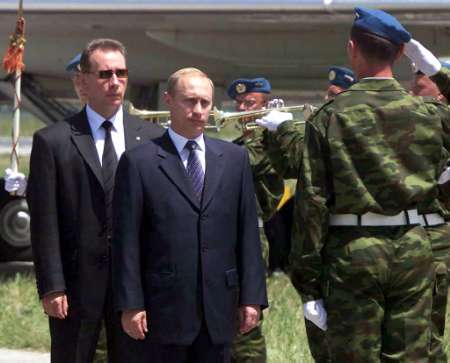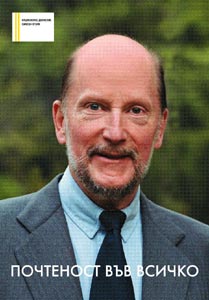Enter content here The former Bulgarian King Simeon II jokes with the press as he arrives at a polling station in Sofia June 17, 2001. Bulgaria votes on Sunday for a new parliament in which two previous main forces are likely to cede the lead to a movement led by the former king Simeon II who entered domestic politics only in April. REUTERS/ Oleg Popov The former Bulgarian King Simeon II casts his ballot in Sofia on June 17, 2001. Bulgaria votes on Sunday for a new parliament in which two previous main forces are likely to cede the lead to a movement led by the former king Simeon II who entered domestic politics only in April. REUTERS/ Oleg Popov Bulgaria's former King Simeon II looks up during his first press conference after the elections in Sofia on June 17, 2001. The exit polls show the ex-monarch as leading the in the Balkan country's general election. REUTERS/Oleg Popov Bulgarian Prime Minister and the leader of the ruling Union of Democratic Forces (UDF) Ivan Kostov casts his ballot at the polling station in Sofia on June 17, 2001. Bulgaria votes on Sunday for a new parliament in which two previous main forces are likely to cede the lead to a movement led by the former King Simeon II who entered domestic politics only in April. REUTERS/Oleg Popov Russian President Vladimir Putin (L) attends a ceremony beside Russian Chief of General Staff Anatoly Kvashnin (R) on his arrival at Slatina airport inPristina June 17, 2001. Vladimir Putin, the first Kremlin leader to visit post-communist Yugoslavia, said the country needed help from the entire international community and that Russians, who share Orthodox Slav roots with the Serbs, were ready to play a part. The Russian and Yugoslav presidents said on Sunday Kosovo was the main source of instability in the Balkans and urged world leaders to ensure Albanian "terrorists" lay down their guns. REUTERS/Hazir Reka  A Russian officer, part in the NATO-led Kosovo peacekeeping force, salute Russian President Vladimir Putin (C) on his arrival at Slatina airport on the outskirts of Pristina June 17, 2001. Vladimir Putin, the first Kremlin leader to visit post-communist Yugoslavia, said the country needed help from the entire international community and that Russians, who share Orthodox Slav roots with the Serbs, were ready to play a part. REUTERS/Hazir Reka Russian President Vladimir Putin (L) and Yugoslav President Vojislav Kostunica addresses reporters after talks in Belgrade June 17, 2001. Putin is in Belgrade for landmark talks with Kostunica at a time of renewed tension in the volatile Balkans. (Viktor Korotayev/Reuters) PRESIDENT TRAJKOVSKI'S PLAN: NO COMPROMISE ON THE TERRITORIAL INTEGRITY. MIA Key principle in the plan of the Macedonian President Boris Trajkovski for surpassing of the crisis in Macedonia is establishment of peace and order on the entire territory of the Republic of Macedonia. According to the plan, changes in the status of Macedonia's territorial integrity will not be allowed under no conditions nor in any form. There will be no compromise on that matter.
The plan will be carried out through several stages. In the first stage, the Macedonian security forces will undertake operations to prevent further expansion of the terrorist activities. For that purpose, the newly established special units that include members of the police and the army will undertake anti-terrorist operations under a special command. The institutional dialogue, but only with the legitimate elected Albanian representatives, will proceed parallel with these operations.
Because the character of the crisis also demands political measures, the president's plan must be supported by all political parties in the country and they must all actively participate in its realization. The international community also must contribute to its realization.
Enhanced border control by the Macedonian security forces, in cooperation with NATO and KFOR, is also needed.
The Macedonian Government will participate in the realization of President Trajkovski's plan for surpassing of the crisis through a coordination body, established today.
The first phase of the plan is the organizational one, which is practically ongoing and includes diplomatic and political initiative, coordinated by a special body composed of 9-11 members. In the second phase, the terrorists would be completely isolated on a military and political field, followed by a strong media campaign, aimed to explain to the domestic and international community the necessity of such a development of the events.
The third phase of Trajkovski's plan foresees declaration of unilateral cease-fire by the Macedonian side, offering 48 hours for terrorists to lay down their arms, and followed by an implementation of measures for restoring of trust. All of those activities will be carried out by the Macedonian security forces in full cooperation with KFOR that will act as a monitoring mission. Its engagement is aimed to prevent any propaganda for excessive use of force by the Macedonian police and army.
The forth, probably most delicate phase, foresees disarmament of terrorists and establishing of peace in the whole country. It will be carried about by the Macedonian security forces in cooperation with representatives of NATO, KFOR or some monitoring mission of the European Union. Considering the complicated procedure for altering of NATO mandate, a bilateral agreement will be signed with one of NATO member countries, most probably the Great Britain, which means inclusion of British soldiers in collection of the arms. Such step has been initially approved by NATO Secretary General George Robertson. It also understands a guarantee that no charges will be brought against the terrorists. The amnesty will be enforced immediately after the process of disarming for all terrorists not deemed guilty of crimes.
The fifth and final phase foresees restoring of normal life in affected areas, meaning that the Macedonian security forces will return to the initial positions and control the terrain.
According to President Trajkovski, this plan has no direct connection with the ongoing political dialogue under his auspices. Therefore, any possible setting of conditions by terrorists regarding the dialogue progress should be neutralized.
This is a complex plan and therefore President Trajkovski expects appropriate media campaign, so that citizen of the affected areas may understand the objectives of the whole operation. One of the main tasks refers to restoring of trust among the local population, by renewal of their homes, implementation of many social projects, improving of living conditions, particularly in the spheres of health care and education. These measures also refer to reintegration of population, i.e. of the people who will lay down their arms, and afterwards included in the normal life of the country. Mortar lands near barracks in Macedonia shoot-out. AFP SKOPJE, June 17 (AFP) -
A mortar round landed near an army barracks in the latest outbreak of hostilities in northern Macedonia Sunday, despite promises from both the army and ethnic Albanian rebels to hold fire during crucial peace talks, an army spokesman said.
The mortar bomb did not explode or cause any casualties when it crashed into the courtyard of a house close to an army barracks in the northern city of Kumanovo, Colonel Blagoja Markovski said.
The incident occurred during a firefight near the rebel-held village of Slupcane in the hills above Kumanovo, as the self-styled National Liberation Army targeted troops based nearby.
The army responded with artillery fire, Markovski said.
Meanwhile, a man was injured in an exchange of fire Sunday afternoon in the center of the flashpoint town of Tetovo in northwestern Macedonia, government spokesman Antonio Milososki said.
Two men in a vehicle tried to lob an explosive device at policemen who had flagged them down at a checkpoint, Milososki said.
The police opened fire, wounding one of the two men, he added, without giving the victim's identity.
A number of police checkpoints have been set up in and around Tetovo, a town with a mainly ethnic Albanian population in northwestern Macedonia.
Heavy fighting erupted on the edge of the town in March when NLA guerrillas occupied hills overlooking the town before being driven back by a concerted army and special police counter-offensive.
Both sides said last week they would cease hostilities during talks between Macedonian Slav and ethnic Albanian political leaders in the coalition to try to agree on a political reform package to address Albanian claims of discrimination.
A third round of talks focusing on changes to the constitution and official recognition of the Albanian language were due to get under way later Sunday.  Poster of CSIINM, Photo Ndsimeon2.org Poster of CSIINM, Photograph Ndsimeon2.org |



